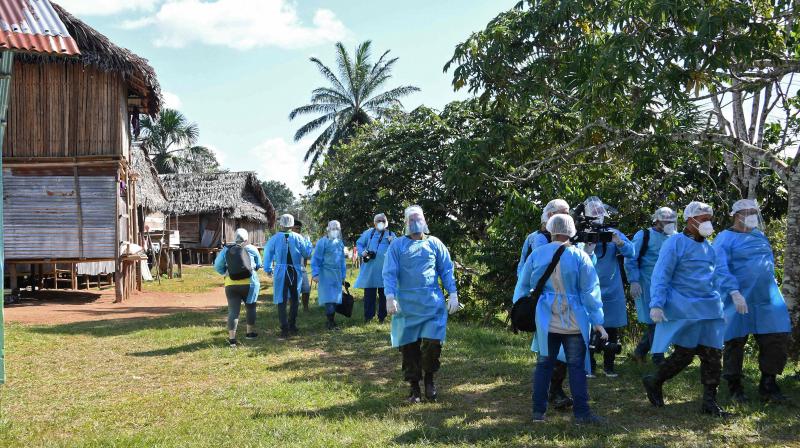Brazil tops 1 million cases seeing as coronavirus spreads inland
20 June, 2020

Brazil’s government confirmed in Friday that the united states has risen above 1 million confirmed coronavirus situations, second only to the United States.
The country’s health ministry said that the full total now stood at 1,032,913, up a lot more than 50,000 from Thursday. The ministry said the sharpened increase was due to corrections of previous times’ underreported numbers.
Brazilian President Jair Bolsonaro even now downplays the risks of the virus following almost 50,000 deaths from COVID-19 in 90 days, saying the impact of cultural isolation measures on the economy could be worse than the disease itself.
Specialists believe the actual number of cases in Brazil could possibly be up to seven moments higher than the official statistic. Johns Hopkins University says Brazil is carrying out typically 14 tests per 100,000 persons every day, and health experts say that quantity is up to 20 times significantly less than had a need to track the virus.
Official data present a downward trend of the virus in Brazil’s north, like the hard-hit region of the Amazon, a plateau in cases and deaths on the countries’ biggest cities near to the Atlantic coast, but a rising curve on the south.
In the Brazilian countryside, which is a lot less ready to handle an emergency, the pandemic is clearly growing. Many smaller metropolitan areas have weaker healthcare systems and standard sanitation that’s insufficient to avoid contagion.
“There is a large amount of regional inequality in our public health system and a shortage of professionals in the interior,” said Miguel Lago, executive director of Brazil’s Institute for Health Policy Studies, which advises public health officials. “That creates many healthcare deserts, with persons going long distances to get attention. When they leave a healthcare facility, the virus can choose with them.”
The cattle-producing state of Mato Grosso was hardly touched by the virus when it hit the nation’s biggest cities in March. Sitting far from the coast, between the Bolivian border and Brazil’s capital of Brasilia, its 3.3 million residents led a mostly normal existence until May. But now its people live under lockdown and meats producers have a large number of infected workers.
In Tangará da Serra, a city of 103,000 persons in Mato Grosso, the mayor decided Friday to forbid the sale of alcoholic drinks for 14 days as an incentive for folks to stay real estate. Fábio Junqueira stated the measure was wanted after a spike in COVID-19 conditions that filled 80% of the city’s 54 intensive care beds. The town has had practically 300 circumstances of the condition, plus three fatalities.
In Rondonópolis, only 300 miles from Tangará da Serra and residence to a thriving economy, health authorities closed the local meatpacking industry after 92 cases were verified there. The town of 144,000 inhabitants counted 21 deaths from the virus and a lot more than 600 instances. The mayor has also decided to limit product sales of alcoholic beverages.
Even regions once taken into consideration examples of good efforts against the virus are actually struggling.
Porto Alegre, home to about 1.4 million persons, had accomplishment in slowing the virus’ spread during the last three months. But now its mayor is usually considering increasing interpersonal isolation actions after ICU occupancy in the city jumped to 80% this month.
“We were already building projections for schools another,” Mayor Nelson Marchezan Jr. advised The Associated Press. “Now the style is to impose more restrictions.”
Outside Sao Paulo town, five regions of the state’s countryside will have to close shops beginning Monday due to a growth in coronavirus conditions. Gov. João Doria declared the decision Friday.
Dr. Mike Ryan, the World Wellbeing Organization’s executive director, explained at a information conference that Brazil needs to increase its attempts to stop the pass on of infections.
“The epidemic continues to be quite extreme in Brazil. I believe health workers are working extremely hard and under pressure in order to deal with the number of conditions that they see every day,” Ryan said. “Certainly the rise isn't as exponential since it was previously, consequently there are a few signs that the situation is certainly stabilizing. But we’ve viewed this before in various other epidemics far away.”
Margareth Dalcolmo, a clinical researcher and professor of respiratory medicine at the state-funded Oswaldo Cruz Base in Rio de Janeiro, believes the reopening in major cities and the virus travelling by road into Brazil’s heartland could keep the pressure on the country’s health system.
“The risk in the inside now is incredibly big,” she said. ”Our health and wellness system just can’t fix the most serious situations of COVID in lots of locations of the countryside.”
Source:
TAG(s):
